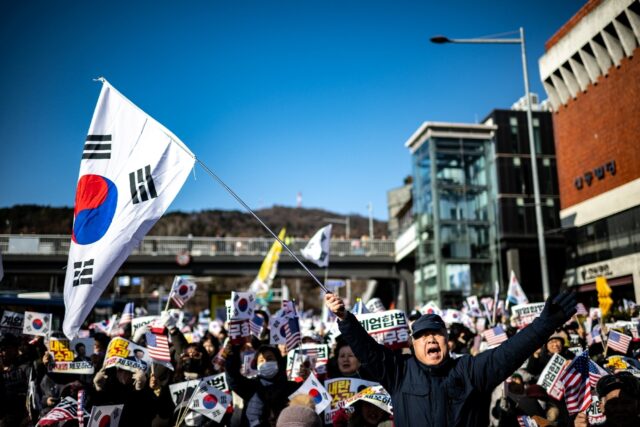South Korea’s impeached President Yoon Suk Yeol remained defiantly in his residence in Seoul on Thursday as investigators probing his ill-fated declaration of martial law sought to detain him for questioning.
Investigators have an arrest warrant but Yoon’s die-hard supporters, including far-right YouTube personalities, are gathering outside in a bid to protect him, setting up potential clashes with police and anti-Yoon protesters.
AFP takes a look at what we know:
What’s going on?
Yoon plunged democratic South Korea into political chaos on December 3 with a declaration of martial law that was quickly voted down by lawmakers, prompting an embarrassing U-turn just hours later.
He was impeached and suspended from office over the debacle, and he is being investigated on charges of insurrection — which is not covered by presidential immunity.
The suspended leader is defiant, sending his hardline supporters a message claiming the country was “in danger” and vowing to fight along side them “to the very end” — raising fears of a dangerous stand-off.
In that letter, Yoon thanked his far-right supporters for “protecting the constitutional order of liberal democracy”.
The message “smacks of despair”, said Vladimir Tikhonov, Korean Studies professor at the University of Oslo.
“More than 60 percent of South Koreans want the impeachment to be approved by the Constitutional Court, and this figure includes a significant number of moderate conservatives,” he told AFP.
Yoon was now appealing to the far right to protect him from legitimate court orders, Tikhonov said, warning it could lead to violence.
Will Yoon be arrested?
Yoon is the first sitting South Korean president to be hit with an arrest warrant.
His guards have previously blocked investigators from executing search warrants and Yoon has refused summonses for questioning three times.
So the key question, experts said, was whether the Presidential Security Service will comply with the warrant — or resist.
Non-compliance would be considered an “obstruction of official duties” that would put the security team at risk of arrest themselves, Kim Hae-won, a constitutional law professor at Pusan National University Law School, told AFP.
Even so, one expert put Yoon’s chance of arrest at around 50 percent, warning that his security team and supporters might trigger a violent clash that would in turn cause a major public backlash.
“The risk of violent conflict is troubling, especially in light of the recent Jeju Air tragedy, which has already caused so much sorrow to the Korean people,” Chae Jin-won of Humanitas College at Kyung Hee University told AFP, referring to Sunday’s plane crash that killed 179 people.
Others such as political commentator Park Sang-byung argued that, legally and procedurally, Yoon’s arrest was “inevitable”.
Yoon cannot evade the Corruption Investigation Office (CIO) forever, Park told AFP, no matter how much he tried.
Is it risky?
AFP reporters saw pro-Yoon protesters outside the presidential compound shouting at police, with live streams showing others scuffling with anti-Yoon protesters nearby.
The opposition has issued an emergency standby order for its lawmakers to stay at the parliament building, saying they needed to “closely monitor” the situation.
Pro-Yoon protesters outside his residence waved South Korean and American flags, with placards that read: “Martial law (is) legal, impeachment (is) invalid”.
However, by throwing in his lot with a small band of far-right supporters — and asking them to protect him from “anti-state forces” — Park said Yoon was only making the situation worse.
“He has made it even more clear that he does not regret his wrongdoings. This situation is not only concerning but also dangerous,” Park said.
What happens next?
South Korean media have reported that CIO officials want to arrest Yoon and take him to their office in Gwacheon near Seoul for questioning.
After that, he can be held for up to 48 hours on the existing warrant. Investigators need to apply for another, formal arrest warrant to keep him in custody.
Yoon also faces a separate Constitutional Court hearing on his impeachment — which, if the court decides to uphold it, would strip him of office entirely.
“The president is likely to assert his innocence when the Constitutional Court’s ruling is announced, which will negatively impact international credibility and heighten economic uncertainty,” Humanitas College’s Chae said.
South Korea is the world’s 10th-largest economy and a global cultural powerhouse, but the growing political crisis means its reputation “will likely suffer”, he said.

COMMENTS
Please let us know if you're having issues with commenting.